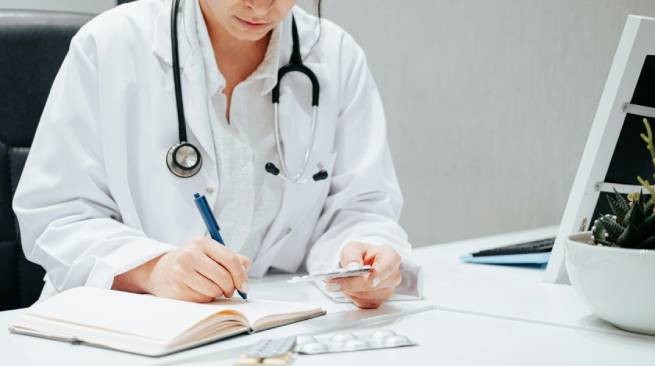A bill on a personal doctor has been submitted for public discussion: free visits to a pediatrician, financial incentives for new doctors, and much more – a total of 7 key changes.
The draft law “Reform of the Institute of Personal Physician – Creation of University Health Centers and Other Provisions” aims to improve public health with an emphasis on prevention, health care for all and reducing inequality. According to the new legislation, every citizen will be able to make a free appointment with a doctor in the area where he lives, and the number of personal doctors will increase significantly.
For the first time, young doctors are given the opportunity financial incentives. Every doctor who chooses to study in the specialties of General/Family Medicine or Internal Pathology in 2025 will receive a one-time payment of 40,000 euros.
With an emphasis on efforts to reduce inequalities in access to health care, the personal pediatrician is being institutionalized. In the first phase, approximately 530,000 children will receive free access for the first time.
Also being created seven university health centersone in each medical educational institution of the country (medical school, faculty), staffed by teachers, with telemedicine stations*. The telemedicine network will have 3,500 home care points across the country. So, wherever they live, Patients will be able to receive care at home with 24-hour continuous medical supervision.
The bill will remain for public discussion until 21:50 on October 8. Health Minister Adonis Georgiadis said:
“Strengthening primary health care is at the core of our reform project. With the new bill, which is being put out for public debate today, we are strengthening the role of prevention and preventive medicine in our country by establishing a personal doctor for all citizens, and at the same time we are extending this measure to pediatricians, with the goal of providing free visits to 530,000 children aged 0 to 16. In addition, from 01.01.2025, in order to include more doctors in the system than the existing ones, we will provide those who choose pathology or general medicine as a specialty with a one-time financial incentive of 40,000 euros, as an addition to their salary. But in addition to the “personal doctor” measure, the new bill introduces a very innovative idea that, I believe, will completely change the health care map. We intend to create seven university health centers that will operate as telemedicine stations in order to effectively monitor and treat residents of the islands and remote areas. Next summer, on all the Greek islands, citizens will have the opportunity, wherever they are, to access teleconsultations from their mobile phones. For me, this is a revolution in health care, which will provide a solution to the eternal problem of access to primary health care for patients in remote areas such as our islands, and at the same time will lead to saving thousands of lives of our fellow citizens.”
Deputy Minister of Health Irini Agapidaki noted:
“Every citizen should have access to healthcare without discrimination, which is a priority for Prime Minister Kyriakos Mitsotakis. At the Ministry of Health, we are constantly working towards this goal. With this bill, we want the system to work more fairly and efficiently. Every citizen should have their own personal doctor, who will guide them and play an important role in their health care and prevention. For the first time, we are encouraging young doctors to choose a specialty that will allow them to become personal doctors, while ensuring that 530,000 children will have a free personal pediatrician. At the same time, the establishment of university health centers and the introduction of telemedicine are an important first step in strengthening primary health care, which aims to bring health care to every citizen, even if they live in the most remote corner of our country. We continue to steadily and effectively implement the National Preventive Program with free preventive examinations and changes in primary health care in order to improve the health of the population, avoid diseases, increase healthy life expectancy and reduce health inequalities. Our commitment to social justice is realized through tangible results.”
The seven main changes introduced by the bill are:
- Increase in private practitionersAll personal physicians in each category will be trained to enable them to perform their role more effectively, particularly in relation to prevention.
- Financial incentives for young doctorsFor the first time, 40,000 euros will be provided as a one-off grant to doctors who decide to undergo training in general/family medicine and internal pathology in 2025.
- Automatic registration. Citizens who have not registered with a personal doctor of their choice by 01.06.2025 will be automatically registered by the system. Registration will be carried out at the level of the municipality or neighboring municipalities so that the citizen has access to a doctor near their place of residence, which reduces barriers to access.
- Creation of a system of performance indicators for personal physicians. It will be based on objective data, such as the participation of the registered population in preventive measures and others.
- Personal pediatrician for children. The first phase of free access to a personal paediatrician for 530,000 children aged 0-16 years is underway. The Ministry of Health aims to increase the number of paediatricians by 100 to cover more than half a million children in the first phase, and to increase the coverage level of the child population in a later phase.
- 7 university health centers. The faculty will work in the University Medical Centers (5 in each Medical Center in Attica and Thessaloniki and 4 in other regions), focusing on providing citizens with preventive and health promotion services, training of Π.Φ.Υ doctors, research, development, programs aimed at improving public health and providing telemedicine services.
- Telemedicine stations and 3,500 home care sites across the country. Telemedicine stations are being introduced in university health centers with the aim of allowing faculty members who will be performing emergency medical work to examine citizens living in remote areas and advise their colleagues accordingly to cope with them. Timely and effective handling of emergencies and reducing unnecessary transfers so that patients can receive home care with 24-hour continuous medical supervision, no matter where they live in the country.
A personal doctor is a free service for all citizenswho receive a personal consultant on health and health education, prevention and diagnosis, treatment and recommendations for serious health problems. This is the citizen's first contact with the health care system. The personal doctor is responsible for prevention, examination, updating the individual electronic health card, prescribing medications and referring for tests to specialist doctors.
*Telemedicine — the use of computer and telecommunication technologies for the exchange of medical information. Telemedicine is a remote consultation with a doctor via the Internet (messengers, video communication, telephone, mail, social networks or special applications). Moreover, we are talking not only about the interaction between the patient and the doctor, but also about communication between medical workers.
Information can be found in Greek Here.






More Stories
Hellenic Navy frigate Ψαρά returns to Greece after mission in the Red Sea
Horrifying figures: Only two in 100 child sexual abuse victims report it
First 388 cameras installed in Athens